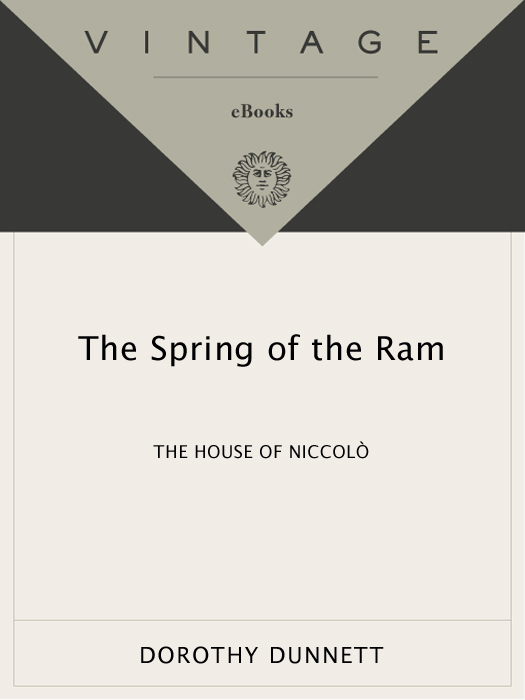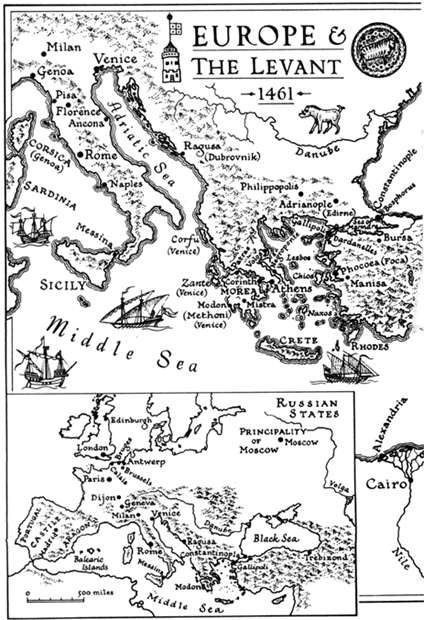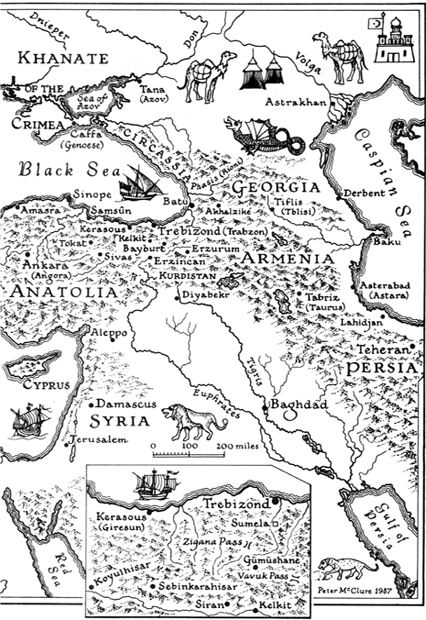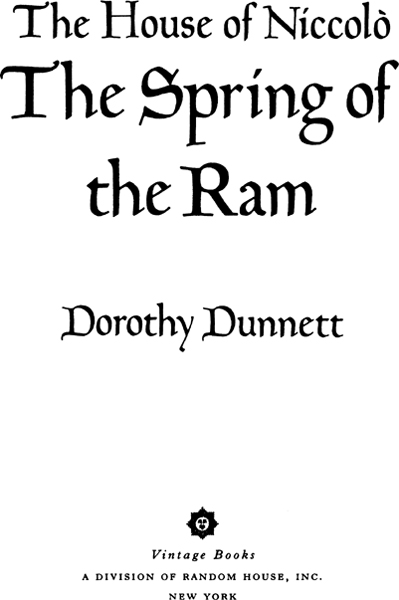Dorothy Dunnett - The Spring of the Ram: The Second Book of The House of Niccolò
Here you can read online Dorothy Dunnett - The Spring of the Ram: The Second Book of The House of Niccolò full text of the book (entire story) in english for free. Download pdf and epub, get meaning, cover and reviews about this ebook. year: 2010, publisher: Vintage Books, genre: Art. Description of the work, (preface) as well as reviews are available. Best literature library LitArk.com created for fans of good reading and offers a wide selection of genres:
Romance novel
Science fiction
Adventure
Detective
Science
History
Home and family
Prose
Art
Politics
Computer
Non-fiction
Religion
Business
Children
Humor
Choose a favorite category and find really read worthwhile books. Enjoy immersion in the world of imagination, feel the emotions of the characters or learn something new for yourself, make an fascinating discovery.

- Book:The Spring of the Ram: The Second Book of The House of Niccolò
- Author:
- Publisher:Vintage Books
- Genre:
- Year:2010
- Rating:4 / 5
- Favourites:Add to favourites
- Your mark:
- 80
- 1
- 2
- 3
- 4
- 5
The Spring of the Ram: The Second Book of The House of Niccolò: summary, description and annotation
We offer to read an annotation, description, summary or preface (depends on what the author of the book "The Spring of the Ram: The Second Book of The House of Niccolò" wrote himself). If you haven't found the necessary information about the book — write in the comments, we will try to find it.
Dorothy Dunnett: author's other books
Who wrote The Spring of the Ram: The Second Book of The House of Niccolò? Find out the surname, the name of the author of the book and a list of all author's works by series.
The Spring of the Ram: The Second Book of The House of Niccolò — read online for free the complete book (whole text) full work
Below is the text of the book, divided by pages. System saving the place of the last page read, allows you to conveniently read the book "The Spring of the Ram: The Second Book of The House of Niccolò" online for free, without having to search again every time where you left off. Put a bookmark, and you can go to the page where you finished reading at any time.
Font size:
Interval:
Bookmark:




PREFACE
When my chronicle of Francis Crawford of Lymond ended, it seemed to me that there was something still to be told of his heritage: about the genetic lottery, as well as the turmoil of trials and experience which, put together, could bring such a man into being.
The House of Niccol, in all its volumes, deals with the forerunner without whom Lymond would not have existed: the unknown who fought his way to the high ground that Francis Crawford would occupy, and held it for him. It is fiction, but the setting at least is very real.
The man I have called Nicholas de Fleury lived in the mid-fifteenth century, three generations before Francis Crawford, and was reared as an artisan, his gifts and his burdens concealed beneath an artless manner and a joyous, sensuous personality. But he was also born at the cutting edge of the European Renaissance, which Lymond was to exploit at its zeniththe explosion of exploration and trade, high art and political duplicity, personal chivalry and violent warfare in which a young man with a genius for organization and numbers might find himself trusted by princes, loved by kings, and sought in marriage and out of it by clever women bent on power, or wealth, or revengeor sometimes simply from fondness.
There are, of course, echoes of the present time. Trade and war dont change much down through the centuries: todays new multimillionaires had their counterparts in the entrepreneurs of few antecedents who evolved the first banking systems for the Medici; who developed the ruthless network of trade that ran from Scotland, Flanders, and Italy to the furthest reaches of the Mediterranean and the Baltic, and ventured from Iceland to Persia, from Muscovy to the deserts of Africa.
Scotland is important to this chronicle, as it was to Francis Crawford. Here, the young Queen of Scots is a thirteen-year-old Scandinavian, and her husbands family are virtually children. This, framed in glorious times, is the story of the difficult, hesitant progress of a small nation, as well as that of a singular man.
Dorothy Dunnett
Edinburgh, 1998
(Those marked * are recorded in history)
Rulers
*France: Charles VII; Louis XI
*England: Henry VI; Edward IV
*Flanders: Duke Philip of Burgundy
*Pope: Pius II
*Milan: Duke Francesco Sforza
*Ottoman Empire: Sultan Mehmet II
Charetty company, Bruges, Louvain and Trebizond
Marian de Charetty, owner
Nicholas vander Poele (Niccol), her husband and former apprentice
Mathilde (Tilde), her older daughter
Catherine, her second daughter
Julius, her notary
Tobias Beventini of Grado, her physician
Father Godscalc of Cologne, her chaplain
Gregorio of Asti, her lawyer
John le Grant, Scots engineer and shipmaster
Astorre (Syrus de Astariis), her mercenary leader
Loppe (Lopez), a former Guinea slave; bursar to Nicholas
Thibault, vicomte de Fleury of Dijon, husband of Marian de Charettys late sister
Tasse of Geneva, maid to Marian de Charetty
Margot, mistress of Gregorio
Patou, assistant to Julius
Thomas, under-captain to Astorre
Medici company, Florence, Pisa, Bruges and Venice
*Cosimo di Giovanni de Medici of Florence, head of the Medici Bank
*Giovanni de Medici, his son
*Cosimino de Medici, son of Giovanni
*Pierfrancesco de Medici, nephew of Cosimo
*Laudomia Acciajuoli, wife of Pierfrancesco
*Angelo Tani, manager, Bruges
*Tommaso Portinari, under-manager, Bruges
*Antonio di Niccol Martelli, sea-consul, Pisa
*Roberto di Niccol Martelli, manager, Rome
*Alessandro di Niccol Martelli, manager, Venice
The company of Strozzi, Florence and Bruges
*Alessandra Macinghi negli Strozzi of Florence, widow of Matteo Strozzi
*Lorenzo di Matteo Strozzi, Bruges, her exiled son
*Filippo di Matteo Strozzi, Naples, exiled elder brother of Lorenzo
*Caterina di Matteo, her daughter
*Marco di Giovanni da Parenti, silk merchant and husband of Caterina
*Jacopo di Leonardo Strozzi, manager, Bruges, and cousin of the late Matteo
Merchants and noblemen, Scotland and Flanders
Simon de St Pol of Kilmirren, landowner and merchant of Scotland
Jordan de St Pol, exiled vicomte de Ribrac, father of Simon
Katelina van Borselen, wife of Simon and niece of Henry van Borselen of Veere
Henry de St Pol, son of Katelina
Agns, her servant
*Henry van Borselen of Veere, Knight of the Golden Fleece
*Franck van Borselen, Knight of the Golden Fleece
*Wolfaert van Borselen, son of Henry
*Mary, princess of Scotland, wife of Wolfaert
*Charles van Borselen, son of Wolfaert and Mary
*Alexander, Duke of Albany, Scottish royal nephew of Wolfaert and Mary
*Pierre Bladelin, Treasurer of the Golden Fleece and Controller to Duke Philip, founder of the Golden Fleece Order
*Louis de Gruuthuse of Bruges, Knight of the Golden Fleece, husband of Marguerite van Borselen
Genoa and Milan
*Anselm Adorne of the Htel Jerusalem, Bruges
Pagano Doria, sea adventurer
Michael Crack-bene, his sailing-master
Noah, his Negro page
*Jacques Doria, Genoese merchant, Bruges
*Prosper Adorno, Doge of Genoa and kin to Anselm Adorne
*Prosper Schiaffino de Camulio de Medici, envoy of the Duke of Milan
Greeks and Byzantines
*David Comnenos, 21st Emperor of Trebizond
*Helen Cantacuzenes, his Empress
*Anna, their younger daughter
*George VIII, King of Georgia, their son-in-law
*Maria Gattilusi, Genoese widow of the Emperors brother Alexander
*Alexios, son of Maria and Alexander
*George Amiroutzes of Trebizond, philosopher, Great Chancellor, Treasurer, Protovestarios to the Emperor
*Alexander and Basil, sons of George Amiroutzes
*Altamourios, Chief Secretary and half-Muslim cousin of the Emperor David
*Violante, daughter of Niccol Crespo, Duke of Naxos, grand-daughter of Emperor John IV of Trebizond and great-niece of the Emperor David
*Bessarion (John) of Trebizond, Cardinal of Nicaea
*Paraskeuas, servant to the Cardinals late mother
*Thomas, Despot of the Morea, brother of the late Constantine, last emperor of Constantinople
*Demetrius, brother of Thomas and joint Despot of the Morea
Persia (The Ak-Koyunlu, the White Sheep Tribe of Turcomans)
*Uzum Hasan, Muslim prince of Diyarbekr, lord of High Mesopotamia and of the White Sheep Tribe and grandson of a princess of Trebizond
*Sara Khatun of Syria, Christian mother of Uzum Hasan
*Sheikh Hseyin, Muslim kinsman of Uzum Hasans Kurdish wife
*Theodora, Christian wife of Uzum Hasan, aunt of Violante, and niece of the Emperor David
Diadochos, Archimandrite of the Greek Orthodox Church, chamberlain to Uzum Hasans Christian household, and to Violante of Naxos
*Mahon Turcomannus, Uzum Hasans envoy to the West under Ludovico da Bologna
Font size:
Interval:
Bookmark:
Similar books «The Spring of the Ram: The Second Book of The House of Niccolò»
Look at similar books to The Spring of the Ram: The Second Book of The House of Niccolò. We have selected literature similar in name and meaning in the hope of providing readers with more options to find new, interesting, not yet read works.
Discussion, reviews of the book The Spring of the Ram: The Second Book of The House of Niccolò and just readers' own opinions. Leave your comments, write what you think about the work, its meaning or the main characters. Specify what exactly you liked and what you didn't like, and why you think so.
